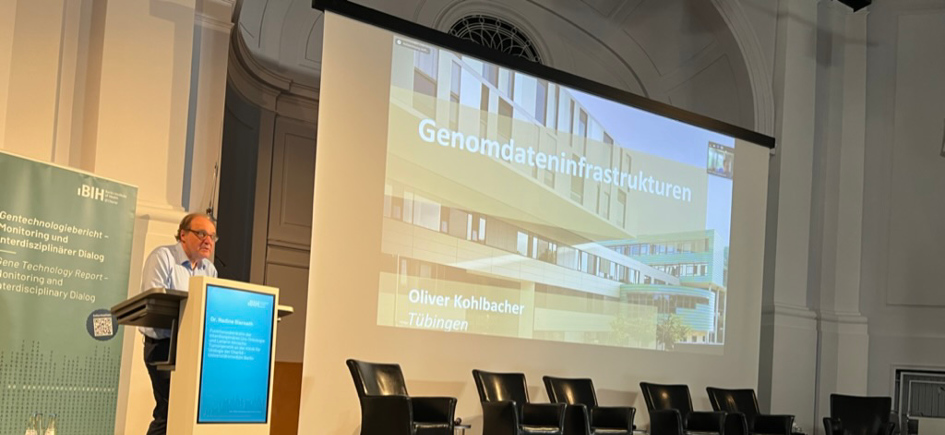Genomic data: Its significance for modern medical research and diagnostics
- 03 Jul 2024
- Kira Furlano
Celebrating the release of their latest brochure "In Focus: Genomic Data" the working group Gene Technology Report, in cooperation with GHGA, invited the public to an evening event discussing the significance of genomic data in modern medical research and diagnostics.
Facilitated by the model project GenomSeq in accordance with § 64e SGB V, genomes obtained through genome sequencing will be used for diagnostic purposes and therapy planning in routine care for the first time. This will lead to genome analysis playing an increasingly important role in clinical routine care - establishing direct links between genome sequencing and individual diagnosis and/or treatment of diseases. Genomic data, however, do not only pose technical challenges in terms of archiving, but also factual challenges in interpretation. The use of genomic data in clinical diagnosis and treatment of diseases as well as research also raises ethico-legal and social questions about handling this highly complex and sensitive data, which have been addressed on this evening.
After a welcome by Boris Fehse, spokesperson of the working group Gene Technology Report, and an introduction by Jörn Walter, Deputy Managing Director, Nadine Biernath explained the practical significance of the model project for diagnosis and treatment using prostate carcinoma as an example. The model project provides an opportunity for broad genetic testing for oncological patients and enables personalised treatment strategies, including the prediction of drug resistances and the genetic evolution of tumors. Next, Oliver Kohlbacher spoke in a virtual presentation about genomic data infrastructures and the pivotal importance of a centralised data archive for genomic research. He introduced a federated data infrastructure that ensures both a secure use and privacy protection for the patients. GHGA provides such a data infrastructure for the model project genome sequencing. Ralf Müller-Terpitz then introduced the aspects related to medical law in a speeddating style. These include the new legal requirements for the EU-specific processing within the EU Health Data Space and the Health Data Use Act. Eva Winkler explained the ethical framework for the use of genomic data. She pointed out the distinctions between clinical and research ethics, and outlined the four ethical discussion grounds: usage of data and protection of privacy, handling of additional findings, informed consent, and governance. Olaf Rieß concluded the presentations by highlighting the significance of the model project for the diagnosis and treatment of rare diseases. He underscored the importance of bringing data together especially with regards to rare diseases as 80 percent of which can be traced back to a monogenetic cause; with this, he referred to the model project and its network.
In the concluding panel discussion, moderated by Jörn Walter, Thorsten Schlomm and colleagues discussed both the clinical challenges and opportunities associated with the use of genome sequencing. Again, ethico-legal aspects as well as the infrastructure and specificities for clinical practice were reviewed. Questions from the audience such as ‘What is the process of sequencing from the initial contact with the physician to the final output?’, ‘Why can some data not be anonymised?’, or ‘What role will artificial intelligence play?’, were answered in an open atmosphere.
On this evening, GHGA was not only present as a cooperation partner for the brochure but also through the expertise of the speakers Eva Winkler, Olaf Riess, Jörn Walter, Oliver Kohlbacher, and Thorsten Schlomm. Once the central role GHGA plays in establishing a secure national omics data infrastructure, providing both a framework for the use of human genome data for research purposes and measures that prevent data misuse became clear.





